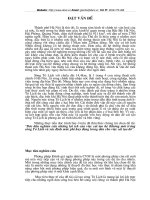Những lợi ích của việc sử dụng ebook
Bạn đang xem bản rút gọn của tài liệu. Xem và tải ngay bản đầy đủ của tài liệu tại đây (783.51 KB, 2 trang )
25
Main Benefits of the eBook
These 25 benefits are based on the preliminary findings of a survey of over
100 high school students as well as an exhaustive review of the literature.
Digital reading at school: progress or diversion? Do eBooks provide more benefits than paper books? Perhaps these are not the questions we should be asking. This
would be like conjecturing whether reading Sumerian legends on a clay tablet is more interesting than reading them in a paper book. The real issue, according to recent
studies, is that today’s students are just not that interested in reading. Not only do they read hardly any or no paper books, they do not tend to read them for fun. In our
study conducted in spring 2014, high school students clearly stated that they read almost no paper books except when it counted for marks or when they were forced to.
In fact, less than 5% of the students we surveyed said that they enjoyed reading books on their own. Some even admitted that they had never read a [paper] book in high
school. So yes, we believe that we are not asking the right questions.
The really fundamental challenge is to get kids to read, to read more, and to read all kinds of texts, not just Facebook pages, text messages, and tweets.
In a world where children are not fond of reading, and where they are swept up in a sea of technologies, eBooks offer 25 benefits for education. These benefits are
grouped into four categories: cognitive, affective, social, and other. We should keep in mind that eBooks alone cannot cure the widespread disinterest in reading among
today’s youth, and that using eBooks in the classroom comes with certain challenges. And as always, teachers and parents play a key role by instilling a love of reading
in young people. The eBook is a promising avenue to achieve this goal.
By Thierry KARSENTI, M.A., M.Ed., Ph.D.
A. COGNITIVE BENEFITS
Canada Research Chair on Technologies in Education, Université de Montréal
@ThierryUdM
1. INTERACTIVITY. Students loved the way eBooks provide practically endless opportunities for interaction, ranging from simple websites
to exchanges with authors.
2. ACCESS. Students appreciated the fact that eBooks provide access to reading anytime, anywhere.
3. VOCABULARY. The eBook makes it easier to learn new words, for example, by clicking on a word to view its definition.
4. NOTE TAKING. Students enjoyed the many ways to annotate texts, audio, and video using a variety of apps.
5. SEARCH. The eBook allows readers to find words and phrases rapidly.
6. READING ALOUD. The VoiceOver function available on certain tablets is helpful for young children learning to read or with reading problems.
7. INDIVIDUALIZATION. The eBook offers invaluable benefits for students with learning problems, including tailored content
(e.g., supplemental pages or sections).
8. LEARNING. Numerous studies have demonstrated the cognitive potential (i.e., increased learning) of the eBook, particularly for textbooks.
9. UPDATES. The eBook allows publishers to continuously update content.
10. FREQUENCY. Students wanted to read eBooks more often than traditional paper books.
11. DURATION. Students spent more time reading eBooks than paper books.
12. ORGANIZATION. Students reported that eBooks and eTexts were easier to organize and prioritize.
25
By Thierry KARSENTI, M.A., M.Ed., Ph.D.
Canada Research Chair on Technologies in Education, Université de Montréal
@ThierryUdM
13. ALL IN ONE PLACE. Students repeatedly stressed the practicality of reading on a tablet, where everything is in one place: dictionary,
search engine, images, sound, etc.
14. VARIETY. Students could readily access a wide variety of books and texts, and teachers regarded the tablets as a kind of world-scale library.
15. QUANTITY. The most recent tablets can contain over 500,00 books, more than anyone can read in a lifetime.
B. AFFECTIVE BENEFITS
16. INTEREST. Students found reading eBooks more interesting than regular books.
17. MULTIMEDIA. The multimedia content (images, sound, video) appealed to students and inspired them to read.
18. ENJOYMENT. Overall, students enjoyed reading eBooks more than regular books.
19. ADAPTATION. The eBook allows many ways of tailoring content for young readers: luminosity, font style, etc.
C. SOCIAL BENFITS
20. SHARING. Students can easily share what they are reading with others. More and more apps allow sharing comments and highlighted
sections via social networks.
21. NETWORKING. Students found it easy to share ideas about common projects.
22. COLLABORATION. Students could collaborate in real time with their classmates when reading texts.
D. OTHER BENEFITS
23. SAVINGS. Schools can cut costs substantially over the medium term by introducing eBooks.
24. ECOLOGY. The eBook has a lower environmental impact.
25. PORTABILITY. Studies have shown that carrying heavy textbooks on a daily basis can negatively affect students’ health.









